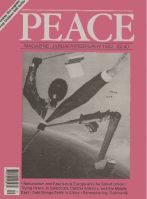
Peace Magazine Jan-Feb 1992, page 30. Some rights reserved.
Search for other articles by PMag staff here
Fourteen women from across Canada toured the U.N. with the Voice of Women in late October, while talks about a new arms registry were taking place. We lobbied for non-violent diplomacy, democratization, and greater inclusion of women.
Ironically we found women among the most cynical players of the disarmament game. "I don't really believe that there will ever be a world without war," said Dr. Jan Priest, Britain's representative to the U.N. Committee on Disarmament.
For the diplomats we spoke with, from Britain, Germany and Canada, disarmament harmonizes naturally with armed conflict. They spoke of the Gulf War and the signing of a new Arms Register in the same breath, as measures to ensure "regional military balance."
We observed the U.N. discussions on the Arms Trade Registry, which will oblige all signing countries to record international sales of arms. Speaking as a member of the U.N. expert group on the registry, Ernie Regehr spoke of the registry as a small but critical step forward.
Lee Feinstein of the Arms Control Association in Washington D.C. was more skeptical. He quoted Bush, saying "our desire to curb proliferation doesn't mean we're going to stop selling anything to anybody."
Our most fiery meeting was with Peggy Mason, Canada's Ambassador for Disarmament. When Celina Tuttle of the DisARMX coalition in Ottawa asked her if there wasn't some contradiction between Canada's commitment to controlling the arms trade and its support for arms bazaars such as ARMX, she replied defensively that there was no contradiction whatsoever.
Asked about her approach to peaceful settlements of regional disputes, she answers "It's a parenthood issue to talk about conflict resolution. It isn't that easy."
Mason argues that the U.N.'s discovery of Iraq's nuclear weapons manufacturing plans justifies once and for all the war against Iraq. Would she support collective military action against anyone suspected of developing nuclear weapons? Mason says "I was happy that the world community responded the way that it did."
Those working in the commissions of the U.N. were much more idealistic.
Aster Zaoude, who works with the women's development group UNIFEM, sees important changes occurring far from the diplomatic assembly rooms. She says the recent creation of a "human development index," which will replace the old Gross National Product, is an important step forward.
The index shows clearly that armament expenditures impede development, and that too little foreign aid goes to basic human needs funding. Canada is specifically cited in the U.N. 's Human Development Report as one of the countries which gives the lowest priority to basic human needs funding.
The pace of disarmament is tortuously slow because "states are given exaggerated importance in the U.N." says Lucy Webster, who spoke to us for the World Disarmament Campaign. Webster describes herself as a "World Federalist," a group which endorses a plan to add a second, directly elected chamber to the United Nations.
We visited Quaker House, a charming brownstone row-house on a sidestreet near the U.N., where the Quakers invite diplomats for tea. Stephen Collett, who heads the Quaker office, briefed us on UNCED, the U.N. meeting on the environment coming up in 1992.
Although the leading world powers refuse to put militarism on the agenda, it will be addressed implicitly as the place from which the funds for the environment must come, says Collett. Non-governmental groups are holding a parallel assembly.
"Preparations for UNCED involve the biggest set of negotiations that the U.N. has ever engaged in, " says Collett. "They will have massive implications for the future U.N. structure. They will promote a much greater linkage between the international level and the local level."
Eighty to 85% of environmental funds will soon be directed to the local level, says Collett, adding, "It will be fun."
So our visit to the grandest diplomatic body in the world, now encompassing 166 sovereign nations, led us back to the argument that small is beautiful.
Regional notes will be back next issue. Send Ontario news to our office.

Peace Magazine Jan-Feb 1992, page 30. Some rights reserved.
Search for other articles by PMag staff here